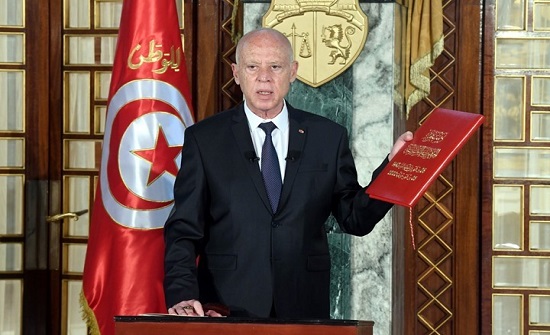Al-Madina News: In response to what he called a “national obligation,” Tunisian President Kais Saied announced his intention to introduce a revision to the electoral legislation governing the parliamentary elections scheduled for December 17.
Saeed was quoted as adding that the modification resulted from what he described as manipulation of the problem of recommendations to elect members of the House of Representatives and the proliferation of “corrupt money” in a statement released by the Tunisian president on Friday evening.
According to the statement, Saeed suggested that if the goals of the existing legislation are not met, it is “national obligation” to stop this issue.
And in September of last year, Saeed issued a presidential decree governing the elections that calls for a method of voting for individuals rather than lists and mandates that candidates gather at least 400 voter recommendations, with at least half coming from women.
Additionally, young voters under the age of 35 must make up 25% of all endorsements.
The new electoral law sparked irate responses as Tunisian legal and electoral affairs experts warned of its catastrophic consequences and potential flaws.
Professor of public law Abdul Razzaq Al-Mukhtar has previously claimed that “Decree No.
55 for the elections carries a number of concerns, the first of which is that the law may be written and made forth in an undemocratic manner because it was not produced by a democratic process that included participation.
The new voting method is also based on individuals and entails dangerous slippages, making it undemocratic squares, Professor Al-Mukhtar cautioned that “the law came in the 90th minute, or a few months before the elections, and not in a respectable electoral time.
In response, Ola bin Najma, the director of the Shahid Observatory for Election Monitoring, urged “Arabi 21” in a statement to ask for the cancellation of the polls and to convene a round of negotiations so that the nation can resume its democratic course.
Ben Najma demanded that the elections be delayed so that the new election law could be revised and revised in light of its serious flaws. He criticised the law’s failure to protect the rights of women and young people and warned of the disarray and uncertainty that would result in the next parliament, especially in light of the parties’ boycott of the elections and the resurgence of tribalism.
Al-Nahda cautions
The “Ennahda” movement also warned against the election law while reiterating its call for “unifying activities aimed at resisting the coup and escalating nonviolent protests against the authority.”
The movement said in a statement that “the current authority headed by Qais Saeed is accountable for tainting political life and turning the economic crisis into a catastrophe that threatens people’s livelihoods.”
She urged “working to restore the democratic road and maintain the liberties, democracy, and national pride gained through the revolution.
And she believed that “the election decree confirmed what the movement had warned about the danger of Qais Saeed’s dictatorial project on the state and society, as it relied on the voting system on individuals, which leads to the striking of the principle of equal opportunities and equality among citizens, as well as the intentional exclusion of parties, women, and youth.
One of President Saeed’s exceptional actions, along with dissolving Parliament and the Judicial Council, making laws by presidential decree, and adopting a new constitution for the nation through a referendum on July 25, 2021, is holding early elections.
The National Salvation Front, which comprises the Ennahda movement, and other members of the Tunisian opposition called for a boycott of the next elections and for their defeat.
Arabic21.
Said plans to change the election legislation, and Ennahda warns against the risks.

